Embracing Sustainability

Sarah Wuethrich of Maggy Hawk Wines
by Emily Pickral
Sarah Wuethrich stands at the helm of Maggy Hawk Wines, yet she didn’t come from a wine-drinking background or have any prior experience in winemaking before attending U.C. Davis. Her unexpected journey into the world of wine began her freshman year, sparked by her father’s newfound hobby of crafting wines at home. Sarah enrolled in an introductory winemaking class on a whim, unaware that it was a decision that would ultimately shape the rest of her career.
Sarah graduated with a degree in Viticulture and Enology in 2001, then honed her technical winemaking knowledge in both large-scale production and boutique settings at Sonoma County wineries like St. Francis and Lambert Bridge. In 2010, Sarah’s journey led her to Copain Wines as Assistant Winemaker, where her passion for cool-climate wines and minimal-intervention winemaking flourished. Seven years later, she assumed the lead winemaker role at Maggy Hawk—a winery owned by Jackson Family Wines (JFW) and synonymous with exceptional cool-climate Pinot Noir and Chardonnay, as well as distinctive White Pinot Noir and Petite Naturelle wines.
Sarah believes that great wines begin with healthy vineyards. One of her most ambitious projects has been a collaboration with U.C. Davis, partially funded by JFW, to study the impact of regenerative farming practices on wine quality. Wine grapes are sensitive crops and susceptible to subtle changes in temperature and precipitation, making them particularly vulnerable to the effects of climate change. Regenerative agriculture, which uses holistic farming and grazing practices to strengthen soil health and crop productivity, may help grape vines become more resilient to changing climate conditions. This research might eventually increase the adoption of regenerative agriculture practices in other vineyards. “We’ve already seen positive changes,” says Sarah. “Improved water holding capacity in the soils, healthier and more resilient vines, and the ability to produce wines with substance and character—wines that leave a lasting impression.”
Sarah has spearheaded the integration of regenerative farming techniques across many JFW properties, including Maggy Hawk’s vineyards, as part of their Rooted for Good initiative. “Regenerative farming isn’t just about improving soil health,” Sarah explains, “it’s about fostering a thriving ecosystem around our vines. By avoiding pesticides, we encourage greater biological diversity in the soil, maintain cleaner water, and support a variety of plants and wildlife. These elements contribute to natural fertility and pest control, ensuring the longevity of our land for future generations.”
Terroir refers to the unique soil and climate conditions present for each vineyard block, as well as the weather conditions during a particular growing season, and well-crafted wines allow the natural terroir that produced its fruit to shine. With this goal in mind, Sarah works closely with veteran vineyard manager Mario Espinoza, employing meticulous farming practices like caring for the vines by hand and on a case-by-case basis. Maggy Hawk has transitioned to full no-till farming, which was previously implemented only in blocks with steep slopes to prevent erosion. Sarah’s fine-tuning techniques throughout the growing season ensure that each vintage embodies the vineyard’s distinct narrative, aiming for a very light touch once the grapes reach the winery.
In the world of cool-climate Pinot Noir, Sarah Wuethrich is a name to watch. Her efforts have earned industry accolades, including the North Bay Business Journal’s Women in Wine Excellence in Winemaking and Sustainability Awards. Yet, reflecting on her career, Sarah remains humble. “I can’t say that I’ve mastered anything—and I never really want to. I consider myself a lifelong student of winemaking,” she says. Currently, she is focused on enhancing her skills in the vineyard and implementing regenerative farming practices across more of JFW’s properties. She is also expanding her business knowledge through the Sonoma State Global Executive Wine MBA program, from which she will graduate next spring. “I view winemaking as a lifelong learning process,” she says. “Each vintage presents new challenges and opportunities to refine my craft.”
Sarah’s work is not just her career—it’s a passion rooted in a commitment to quality, creativity, and environmental stewardship. This enthusiasm is evident in her Instagram video updates from the vineyard and the lab, where she shares what’s happening in the farming or winemaking process at the moment. Friendly, clear, and engaging, the videos can snag the attention of wine lovers at any level, providing interesting insights into Sarah’s work while also capturing her affection for the area.
“Maggy Hawk is my love letter to Anderson Valley,” shares Sarah. Whether you find her in the lab, the cellar, or the foggy vineyards of the Anderson Valley’s Deep End (the northwest portion that is closest to the coast), Sarah will continue to craft wines that narrate the land’s story, reflecting her deep-rooted passion and unwavering commitment to sustainability.
Maggy Hawk
9001 Highway 128, Philo
(707) 901-9040 | maggyhawk.com
Open Thurs - Mon 10:30am - 4:00pm
Photos courtesy of Maggy Hawk
Emily Pickral, a Master Sommelier since 2013 and the 19th woman in the world to earn the title, has over 20 years of experience in sales and marketing for importers, distributors, and California wineries. Emily now serves as the Priority Activation Director for Jackson Family Wines.

